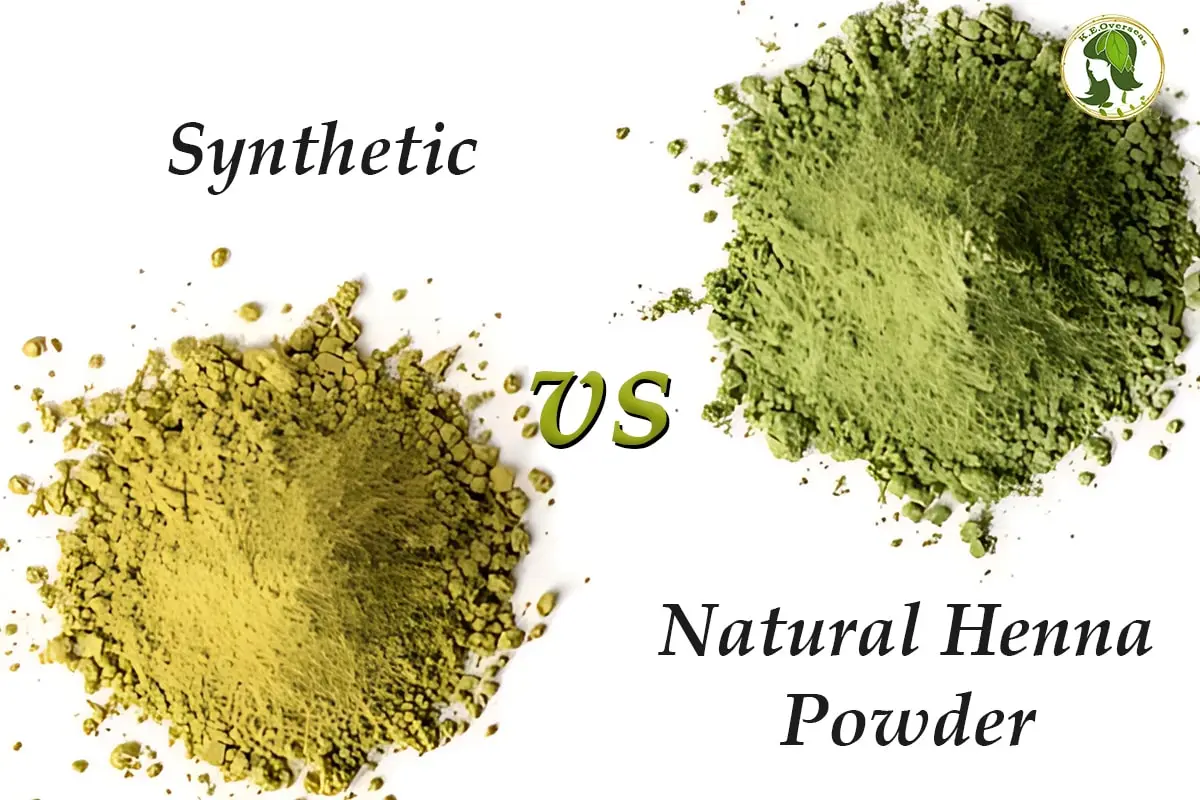Synthetic Henna Vs Natural Henna Powder
Synthetic Henna Vs Natural Henna Powder are two distinct products used for temporary body art and hair colouring. They differ in their composition, properties, and potential side effects.
Natural henna powder originates from the leaves of the henna plant, scientifically known as Lawsonia Inermis. In contrast, synthetic henna is a chemical concoction engineered to replicate the colouring attributes of its natural counterpart.
For millennia, natural henna has found extensive utility in body art and hair colouring, earning its reputation as a safe option for the majority of users when applied correctly. Conversely, synthetic henna is often produced using a blend of chemical compounds, commonly incorporating para-phenylenediamine (PPD), an acknowledged irritant with a documented history of inducing allergic responses in specific individuals.
The primary distinctions between Synthetic Henna Vs Natural Henna Powder are as follows:
Source:
Natural Henna: Natural henna, also known as Lawsonia Inermis, is derived from the leaves of the henna plant. For millennia, it has been used for hair dyeing and tattooing in an array of civilizations.
Synthetic Henna: Synthetic henna, on the other hand, is not derived from the henna plant. It is typically a chemical dye created to mimic the appearance of natural henna.
Ingredients:( Synthetic Henna Vs Natural Henna)
Natural Henna: The main colouring component of natural henna is lawsone. It is a naturally occurring dye molecule discovered in the leaves of the henna plant. To make natural henna paste, the leaves are crushed and mixed with water lemon juice or essential oils.
Synthetic Henna: The material contains synthetic chemicals including PPD (para-phenylenediamine), which gives synthetic henna its colouring effect. It may also contain other additives and chemicals to achieve specific colours and effects.
Color Results:
Natural Henna: Natural henna typically produces a reddish-brown to deep-brown stain on the skin and hair. Also, it doesn’t give intense color. Thus, making Natural Henna one of the best henna powders for your hair.
Synthetic Henna: Synthetic henna can give a variety of colours, including black, blue, green, and more, due to the use of synthetic dyes. It can create a more vibrant and intense colour due to the chemicals included in it as compared to natural henna.
Safety and Allergic Reactions:
Natural henna: While the majority of individuals view natural henna as safe. But there exists a slight possibility that certain people may encounter unfavourable effects. But skin responses and allergic responses to natural henna are generally milder and ignorable.
Synthetic Henna: Synthetic henna, particularly PPD-containing black henna, can result in severe allergic responses that can leave scarring, blistering, and skin irritation. The use of PPD in synthetic henna, a known allergy, raises serious questions about the safety of the skin.
Duration: (Synthetic Henna Vs Natural Henna)
Natural Henna: As the outer skin layer sheds or as the hair develops, the colour from natural henna normally fades over the course of one to three weeks.
Synthetic Henna: Synthetic henna can be more difficult to remove and may linger longer on the skin. The hair, its longevity varies depending on the specific product and hair type.
Conclusion
There are several differences between Synthetic Henna Vs Natural Henna Powder, including their source, components, safety, and color outcomes. Weighing the trade-offs is vital when deciding between these two solutions. Natural henna is generally considered to be safer and the best henna powder for your hair than synthetic henna, despite the fact that synthetic henna has a wider range of colors and, it particularly contains PPD, which raises safety concerns. Additionally, natural henna’s long-lasting, earthy tones have an enduring appeal in the world of temporary body art and hair coloring.
Kirpal Export Overseas (KEO), is a globally leading manufacturer and exporter of natural products such as Natural Henna Powder, Herbal Hair Colors, Henna Based Hair Colors (with a very low % of chemicals), Fast Acting Henna Colors, Indigo Powder for hair coloring, eyebrow colors, sideburn and beard colors, and Indian herbs. These organic developments are tested with diverse parameters to deliver the best product satisfaction of natural products for the audience.
FAQ
1. What is Henna Powder?
Henna powder is a natural dye made from the leaves of the henna plant. henna is very popular in India (mehndi). When applied to the hair, it imparts a reddish-brown tint and is also used for skin art. It is popular for its conditioning properties and ability to strengthen and nourish hair.
2. How to Use Henna Powder for Hair?
- Clean Hair: Wash the hair with shampoo to remove any dirt and oil. do not use conditioner.
- Dry Hair: make sure your hair is completely dry before applying henna.
- Detangle: brush your hair to remove any tangles, making the application process easier.
- Protects skin: apply a thin layer of petroleum jelly or coconut oil around your hairlines, ears, and neck to prevent henna from staining your skin.
3. How to use henna for best results?
- Repeat Applications: for best results, apply henna 3-4 times a month. it makes the colour long-lasting and vibrant.
- Past Chemical Treatments: if you have had any chemical treatments (like keratin, botox, or spa treatments) in the past three months, they can affect how the henna colour initially. you may not see the true colour until after 3-4 application.
- True Color: the true colour of the henna on your hair will be seen after 3-4 applications, as the henna builds up and interacts with your natural hair colour.
4. What Are the Benefits of Using Henna Powder for Hair?
- Natural hair colouring without the use of chemicals.
- Strengthens and conditions hair, reducing breakage and split ends.
- It helps to balance scalp pH, reducing dandruff and promoting hair growth.
- Adds shine and volume to the hair.
5. Is Henna Powder Safe for All Hair Types?
Yes, the henna powder is generally safe for all hair types, including curly, wavy, straight, and oily hair. It is a natural product and doesn’t contain harsh chemicals that can damage hair. However, always perform a patch test to ensure no allergic reactions occur.
6. What Is the Best Henna Powder for Hair?
The best henna powder for hair is 100% pure and free from additives, chemicals, or metallic salts. Organic and finely sifted henna powder ensures easier application and better results.
7. How Often Can I Use Henna Powder on My Hair?
You can safely use henna powder on your hair every 4 to 6 weeks. Frequent use may deepen the colour, but henna’s conditioning effects can help keep hair healthy even with regular application.
8. What Is Black Henna Powder?
Black henna powder is typically a blend of henna with indigo powder or other ingredients to achieve a darker, blackish hue. While traditional henna imparts a reddish-brown colour, black henna can provide darker shades ranging from dark brown to jet black.
9. Is Black Henna Safe to Use?
Pure black henna made from natural ingredients like indigo is generally safe. However, some commercial black henna products may contain chemicals like PPD (para-phenylenediamine), which can cause allergic reactions or damage to the skin and hair. Always choose black henna products that are chemical-free and made from natural ingredients.
10. Can I Mix Henna Powder and Black Henna Powder?
Yes, mixing henna powder with black henna powder (or indigo powder) can help you achieve different shades of brown to black. For example, applying henna first and then indigo can result in a rich black colour. The proportions and application process can vary based on your desired outcome.
11. Does Henna Powder Cover Grey Hair?
Henna powder effectively covers grey hair, but it typically results in a reddish-orange colour on grey strands. You can combine henna with indigo or other natural ingredients to achieve brown or black tones on grey hair if you prefer darker shades.
12. What is the Post-Care for henna application on hair?
- Application Time: leave the henna on your hair for 60 minutes.
- Keep It Warm: heat the head with a hairdryer over a towel for free minutes or cover it with a dry towel. cover your hair with a shower cap or plastic wrap to keep the henna moist and warm.
- Wash: wash your hair gently with your fingers to remove as much as henna. use the shampoo and conditioner normally. the colour will be dark within 3-4 days.
- Avoid Heat: try to avoid using heat styling tools for a few days to prevent drying out hair and to maintain the colour. limit exposure to sunlight, it can fade colour more quickly.
13. Can I Use Henna Powder on Chemically Treated Hair?
Yes, you can use henna powder on chemically treated hair. However, it’s recommended to wait at least 4 to 6 weeks after a chemical treatment (e.g., colouring, perming) before applying henna. Henna is a natural product and can help restore the health of chemically treated hair, but it may interact differently depending on your previous treatment.

